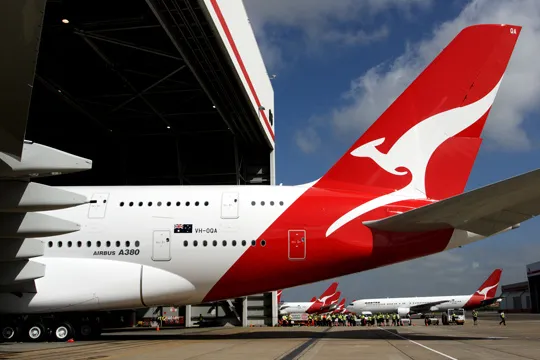
Qantas tips strong finish to the year after interim profit falls
Feb 20, 2019

Qantas Airways has reported a decline in its interim profit, attributing the drop to various factors including rising fuel costs and operational challenges. Despite this setback, the airline remains optimistic about finishing the year on a strong note, buoyed by robust demand for travel and strategic investments in capacity. Qantas is focusing on enhancing its services and expanding its routes to capitalize on the post-pandemic recovery in air travel. The airline's management is confident that these initiatives will help improve profitability and strengthen its market position moving forward.
Qantas Airways has recently revealed its interim financial results, which show a decrease in profit compared to the previous year. Despite this setback, the airline is optimistic about finishing the year on a strong note, bolstered by increased travel demand and strategic initiatives. This article delves into the factors influencing Qantas' performance, the implications of their financial results, and what lies ahead for the airline.
Qantas Interim Profit Overview
The interim profit for Qantas has fallen, highlighting the challenges faced by the airline industry in the wake of economic fluctuations and changing travel patterns. According to the latest report, Qantas reported a net profit after tax of AUD 1.2 billion for the first half of the fiscal year, down from AUD 1.4 billion in the same period last year. Despite this decline, Qantas remains confident in its capacity to recover and adapt to the evolving market landscape.
Key Factors Impacting Performance
Several factors have contributed to the dip in Qantas' interim profit. Among these, rising fuel costs and ongoing supply chain issues have significantly impacted operational expenses. However, the airline has taken proactive measures to mitigate these challenges, such as optimizing routes and improving operational efficiency.
Travel Demand Resurgence
One of the primary reasons for Qantas’ optimism is the resurgence of travel demand. With borders reopening and international travel restrictions easing, the airline has witnessed a surge in bookings. The demand for both leisure and business travel has rebounded significantly, which Qantas anticipates will lead to improved financial performance in the second half of the year.
Operational Improvements and Cost Management
To navigate the current challenges, Qantas has implemented several operational improvements. These include:
| Initiative | Description |
|---|---|
| Route Optimization | Adjusting flight schedules and routes to maximize profitability and reduce costs. |
| Fuel Hedging | Utilizing hedging strategies to protect against volatile fuel prices. |
| Operational Efficiency | Streamlining processes and investing in technology to enhance productivity. |
These strategic initiatives are designed to strengthen Qantas’ financial position and improve overall performance as the travel landscape evolves.
Future Outlook and Growth Prospects
Looking ahead, Qantas is focused on leveraging growth opportunities in both domestic and international markets. The airline has plans to expand its fleet and enhance its service offerings to cater to the increasing demand. Additionally, Qantas is exploring new partnerships and alliances to broaden its reach and enhance customer experience.
Furthermore, the airline has committed to sustainability initiatives, which are becoming increasingly important to travelers. By investing in more fuel-efficient aircraft and implementing eco-friendly practices, Qantas aims to attract environmentally conscious consumers while also reducing operational costs in the long run.
Qantas' Commitment to Customer Experience
Improving customer experience remains a priority for Qantas. The airline is continually seeking feedback from passengers and making adjustments to its services. Enhancements in in-flight offerings, loyalty programs, and customer service training are all part of Qantas’ strategy to retain and attract customers in a competitive market.
Conclusion: A Strong Finish Ahead
In conclusion, while Qantas’ interim profit has seen a decline, the airline’s proactive measures and positive market trends signal a potentially strong finish to the year. By focusing on operational efficiency, capitalizing on the resurgence of travel demand, and committing to customer experience and sustainability, Qantas is well-positioned to navigate the challenges ahead and emerge stronger in the competitive aviation industry.
The journey of recovery and growth for Qantas is just beginning, and stakeholders remain hopeful that the airline will not only rebound but thrive in the coming months, reinforcing its status as a leading player in the global airline market.
Related Articles

Explore Thailand: The Best Islands to Visit for Paradise, Adventure, and Relaxation

The Ultimate Guide to the Best Islands in Thailand for Your Next Getaway

Do babies need passports? How to get a passport for a newborn

How to get a U.S. passport fast: here’s how to expedite the process

What is Mobile Passport Control: 5 reasons why you should use it

SENTRI vs. Global Entry: A detailed guide

Do you need a passport to go to the Bahamas? Let’s find out

Do you need a passport to go to Mexico? A detailed guide

Do you need a passport to go to Canada? We got the answer

Do You Need a Passport for a Cruise: An Essential Travel Guide

Booster Seat Requirements: All the Rules to Follow in Your Rental Car

What Are the World’s Most Powerful Passports, and How Does Yours Rank?

How to Take a Passport Photo at Home: A Helpful Guide

You've got to have heart! Southwest's new livery

Your opinion: Should water be free on low cost carriers?

Young women bolder than guys as solo travellers
